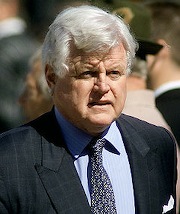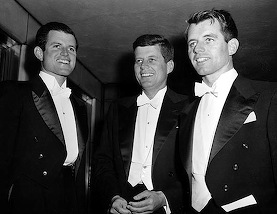Teddy bear treatment on HBO for the last surviving Kennedy brother
07/13/09 09:08 AM


By ED BARK
This isn't February, but HBO's Teddy: In His Own Words is a valentine nonetheless.
It also can be pictured as low-hanging fruit for conservative commentators, who rightly can huff, "They'd never do anything like this for Ronald Reagan, Richard Nixon or a Bush."
Teddy of course is Sen. Edward M. Kennedy, who's represented Massachusetts for 46 years and now is battling brain cancer. HBO's 90-minute documentary, premiering Monday, July 13th at 8 p.m. (central), is from the producer of JFK: In His Own Words and Bobby Kennedy: In His Own Words. So you're not getting a lot of objectivity here.
Like its predecessors, the Teddy film is a feast of family home movies and evocative archival footage. It has pulling power in that respect. But the subject's accompanying words, gleaned from previous interviews, are almost uniformly unrevealing. And the Chappaquiddick incident, which proved to be Ted Kennedy's waterloo, is treated more as another tragedy befalling the senator than a tragedy he caused.
The documentary cries out for a cogent self-analysis from the now 77-year-old senator, whose three older brothers, Joe, John and Robert, all met tragic ends, two by assassination. But the closest we get is black-and-white footage from an old press conference in which he's asked whether he intends to run for president.
"We don't make long-term plans is the experience that we've had," Ted says, his voice trailing off.
There's also audio tape of President Nixon coldly plotting against Ted Kennedy and the senator himself directing some big chill rhetoric at Reagan.
"Ronald Reagan must love poor people, because he's creating so many more of them," he says.
The original music composed for Teddy is notably pedestrian, although reliably sinister when Nixon is on camera. His divorce of the alcoholic Joan Kennedy is only passingly noted, as is the subject's brief public acknowledgment of his own personal shortcomings.
Entirely missing is the famous 1979 television interview with CBS correspondent Roger Mudd, in which Kennedy was asked, "Senator, why do you want to be president?" His answer, widely viewed as rambling and incoherent, led to a decline in his poll numbers as he unsuccessfully sought to unseat incumbent Democratic president Jimmy Carter.
Teddy begins and ends with its subject's rousing speech at the 2008 Democratic National Convention, his first public appearance since undergoing surgery for brain cancer.
"And the dream lives on," he pledged.
Teddy: In His Own Words is something of a dreamscape as well. It's more infomercial than documentary, celebrating the life of the Senate's reigning liberal lion without reservation. Many of the images still resonate, beginning with a still picture of a smiling little Teddy in short pants as his father and the family arrive in London to begin Joe Sr.'s tenure as U.S. ambassador way back in 1938.
Ted Kennedy since has endured and emerged as his sprawling family's patriarch. But this air-brushed documentary won't stand the test of time.
GRADE: C
